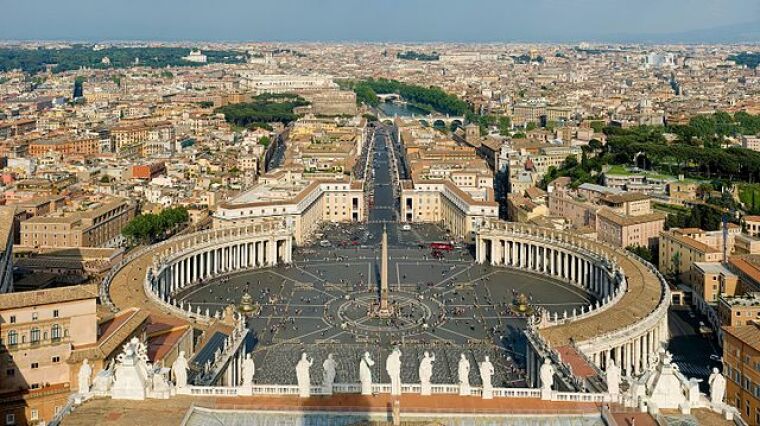China orders travel agencies to stop sending tourists to Vatican

The Chinese government has reportedly banned tour groups from visiting the Vatican and St. Peter's Basilica as the Holy See struggles to improve its diplomatic relations with Beijing.
According to a report from Radio Free Asia (RFA), travel agencies in China have received a directive dated Nov. 16 instructing them to delete or cancel the Vatican and St. Peter's Basilica from their list of destinations.
"Travel agencies are required to cancel any tours that include the Vatican or St. Peter's in the itinerary," the directive said.
"Any travel agency found to be advertising these destinations in their promotional literature or other products will be fined up to 300,000 yuan [US$45,466]," it continued.
Asia News reported that its correspondents in China have confirmed that the directive is in effect, although there are doubts that it will be observed.
An employee at Phoenix Holidays International Travel Agency suggested that the order was based on the fact that China does not have "diplomatic links with the Vatican."
The Chengdu branch of Phoenix Holidays, as well as other travel agencies, also said that they have received similar orders.
An official at the Guangdong provincial branch of the State Tourism Bureau told RFA that the order was issued at the highest level of government.
"We didn't send this out; it was the central government. The Vatican, as a sovereign state under the rule of the Pope, hasn't legally recognized us. This is a diplomatic issue, so only the ministry of foreign affairs or the State Tourism Bureau would have the authority to [to decide this]," the official said.
The directive came after China and the Vatican took part in an artwork exchange for the first time, a move that has been hailed as a sign of warming relations between the two countries.
Forty items have been lent to the Vatican's museums while 40 pieces from the Holy's collection of Chinese bronzes, ceramics and paintings are scheduled to tour four cities in China beginning in March next year.
Both Pope Francis and his predecessor Pope Benedict XVI have enthusiastically sought to improve diplomatic ties with China. However, relations between the city-state and the communist regime have come under repeated strain under the administration of President Xi Jinping due to the Vatican's insistence that the pope should have the authority to ordain Chinese bishops.
Human rights activists and some academics have speculated that Xi will take a tougher stance on religious freedom in China, following his appointment to a second term as leader of the ruling Communist Party.
 Christians don't have to affirm transgenderism, but they can’t express that view at work: tribunal
Christians don't have to affirm transgenderism, but they can’t express that view at work: tribunal Archaeology discovery: Medieval Christian prayer beads found on Holy Island
Archaeology discovery: Medieval Christian prayer beads found on Holy Island Presbyterian Church in America votes to leave National Association of Evangelicals
Presbyterian Church in America votes to leave National Association of Evangelicals Over 50 killed in 'vile and satanic' attack at Nigerian church on Pentecost Sunday
Over 50 killed in 'vile and satanic' attack at Nigerian church on Pentecost Sunday Ukrainian Orthodox Church severs ties with Moscow over Patriarch Kirill's support for Putin's war
Ukrainian Orthodox Church severs ties with Moscow over Patriarch Kirill's support for Putin's war Islamic State kills 20 Nigerian Christians as revenge for US airstrike
Islamic State kills 20 Nigerian Christians as revenge for US airstrike Man who served 33 years in prison for murder leads inmates to Christ
Man who served 33 years in prison for murder leads inmates to Christ


 Nigerian student beaten to death, body burned over ‘blasphemous’ WhatsApp message
Nigerian student beaten to death, body burned over ‘blasphemous’ WhatsApp message 'A new low': World reacts after Hong Kong arrests 90-year-old Cardinal Joseph Zen
'A new low': World reacts after Hong Kong arrests 90-year-old Cardinal Joseph Zen Iran sentences Christian man to 10 years in prison for hosting house church worship gathering
Iran sentences Christian man to 10 years in prison for hosting house church worship gathering French Guyana: Pastor shot dead, church set on fire after meeting delegation of Evangelicals
French Guyana: Pastor shot dead, church set on fire after meeting delegation of Evangelicals ‘Talking Jesus’ report finds only 6% of UK adults identify as practicing Christians
‘Talking Jesus’ report finds only 6% of UK adults identify as practicing Christians Mission Eurasia ministry center blown up in Ukraine, hundreds of Bibles destroyed: 'God will provide'
Mission Eurasia ministry center blown up in Ukraine, hundreds of Bibles destroyed: 'God will provide' Church holds service for first time after ISIS desecrated it 8 years ago
Church holds service for first time after ISIS desecrated it 8 years ago Burger King apologizes for 'offensive campaign' using Jesus' words at the Last Supper
Burger King apologizes for 'offensive campaign' using Jesus' words at the Last Supper Uganda: Muslims abduct teacher, burn him inside mosque for praying in Christ’s name
Uganda: Muslims abduct teacher, burn him inside mosque for praying in Christ’s name